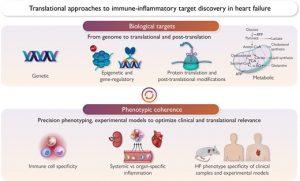Heart failure (HF) is a complex and multifactorial disease that has increasingly been linked to inflammation. Over the past several decades, research has shown that inflammation is both a cause and a consequence of heart failure, contributing to its onset and progression. Chronic inflammation, whether driven by metabolic disturbances or immune system dysfunction, plays a crucial role in exacerbating heart failure symptoms and worsening patient outcomes.

Figure 1: Deconstructing inflammatory risk for HF: translational strategies from biology to phenotype.
A key finding in recent heart failure research is the connection between immune-mediated inflammation and heart failure subtypes, such as heart failure with preserved ejection fraction (HFpEF) and heart failure with reduced ejection fraction (HFrEF). Studies have revealed that immune cells, such as macrophages, infiltrate the heart following acute injuries like a myocardial infarction. These cells release inflammatory cytokines, which, while initially intended to repair tissue, often contribute to long-term damage and fibrosis. Interleukin-1 (IL-1) has emerged as a critical player in this process, with therapies targeting IL-1 showing potential benefits in reducing heart failure hospitalizations.
However, the clinical application of anti-inflammatory therapies in heart failure has not been without challenges. While canakinumab, an IL-1β inhibitor, has shown promise in clinical trials, the heterogeneity of heart failure as a disease complicates efforts to develop universal treatments. The underlying causes of heart failure differ significantly between patients, requiring personalized approaches to inflammation modulation.
Research continues to explore the genetic and epigenetic mechanisms that govern immune responses in heart failure, with the goal of identifying specific biomarkers that could guide treatment. As the field of cardio-immunology advances, more targeted and effective therapies may emerge, offering hope for patients with inflammatory-driven heart failure.
Journal Article: Feinstein, Matthew J. “Human Immunology of Heart Failure: Deconstructing Inflammatory Risk.” European Heart Journal, vol. 45, no. 28, Spring 2024, pp. 2505–2507.
Summary by Faith Oluwamakinde










